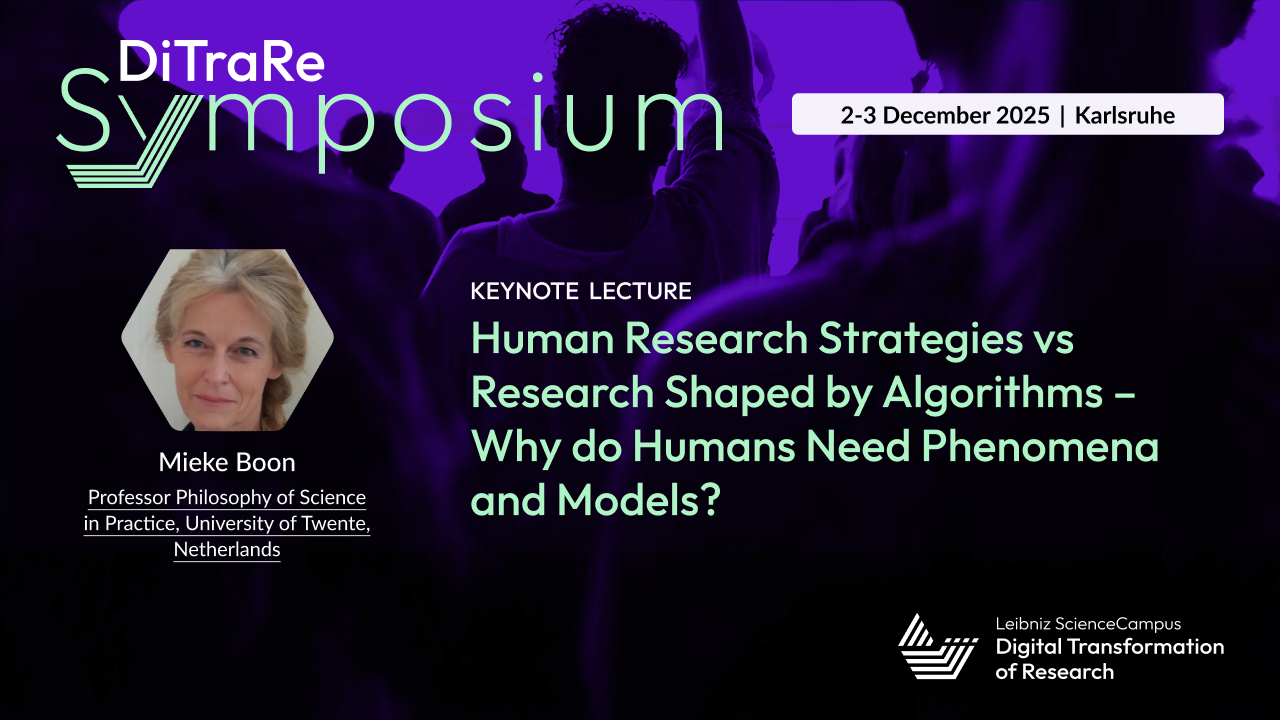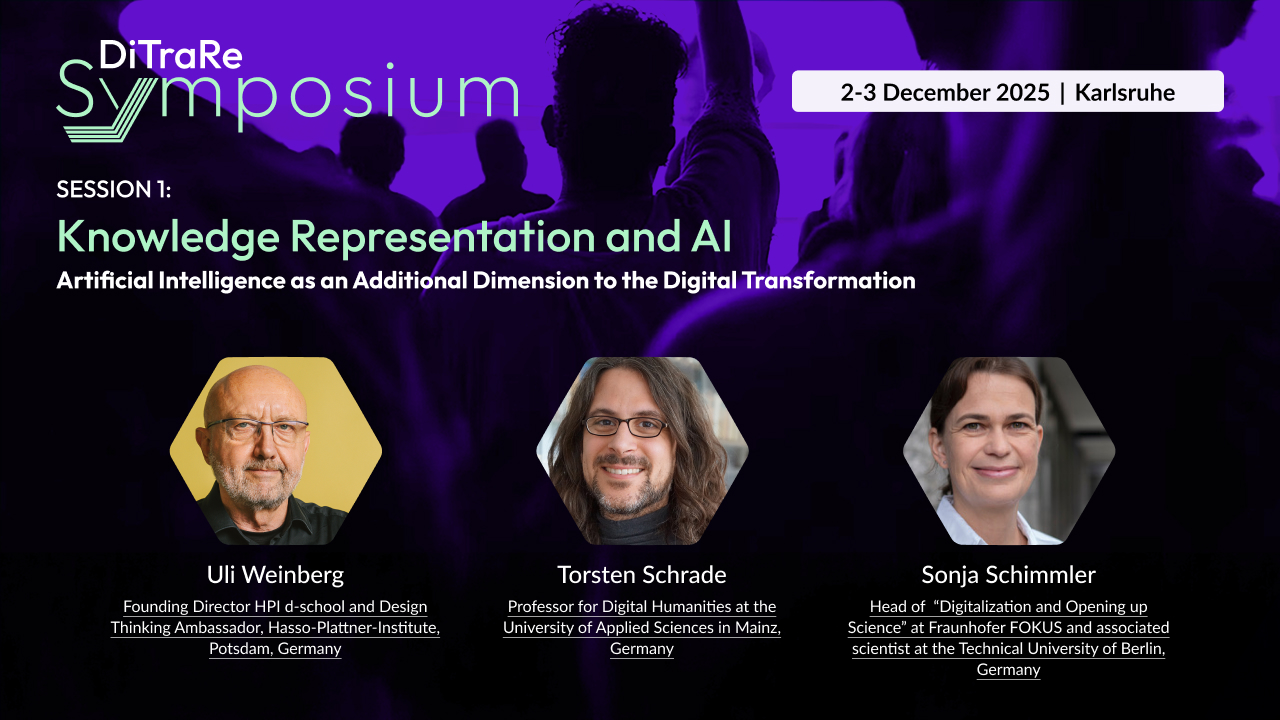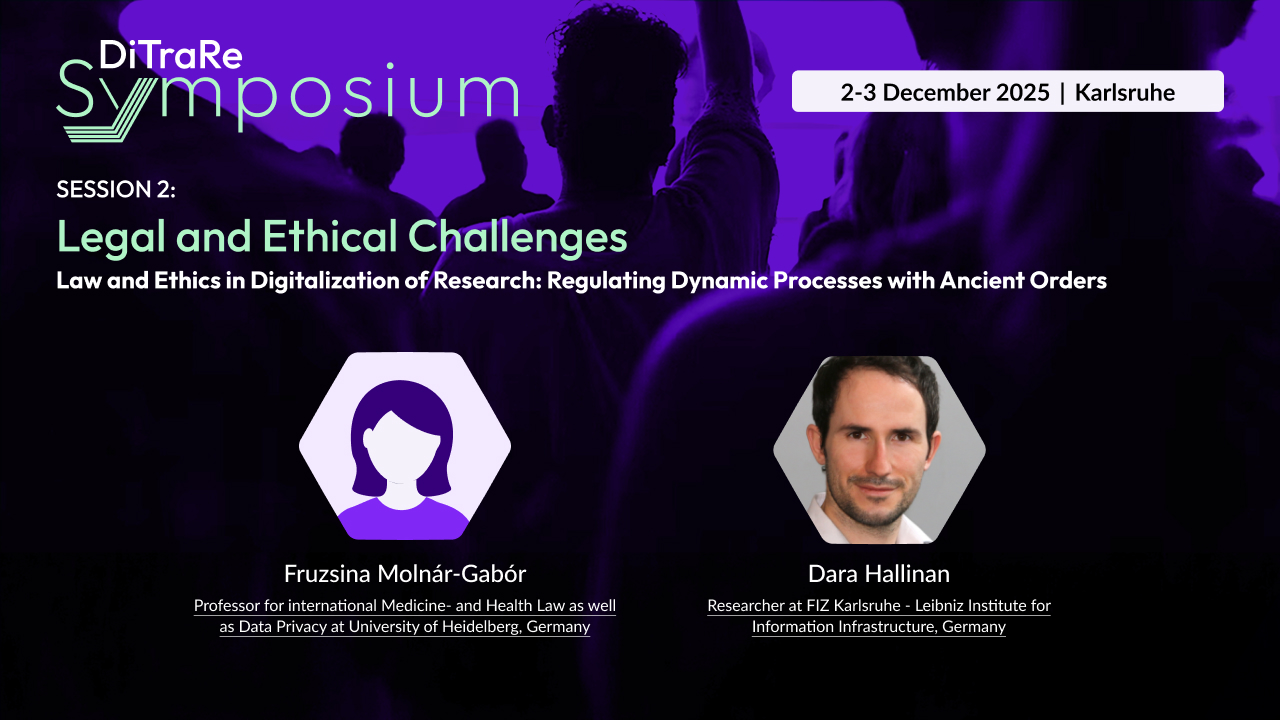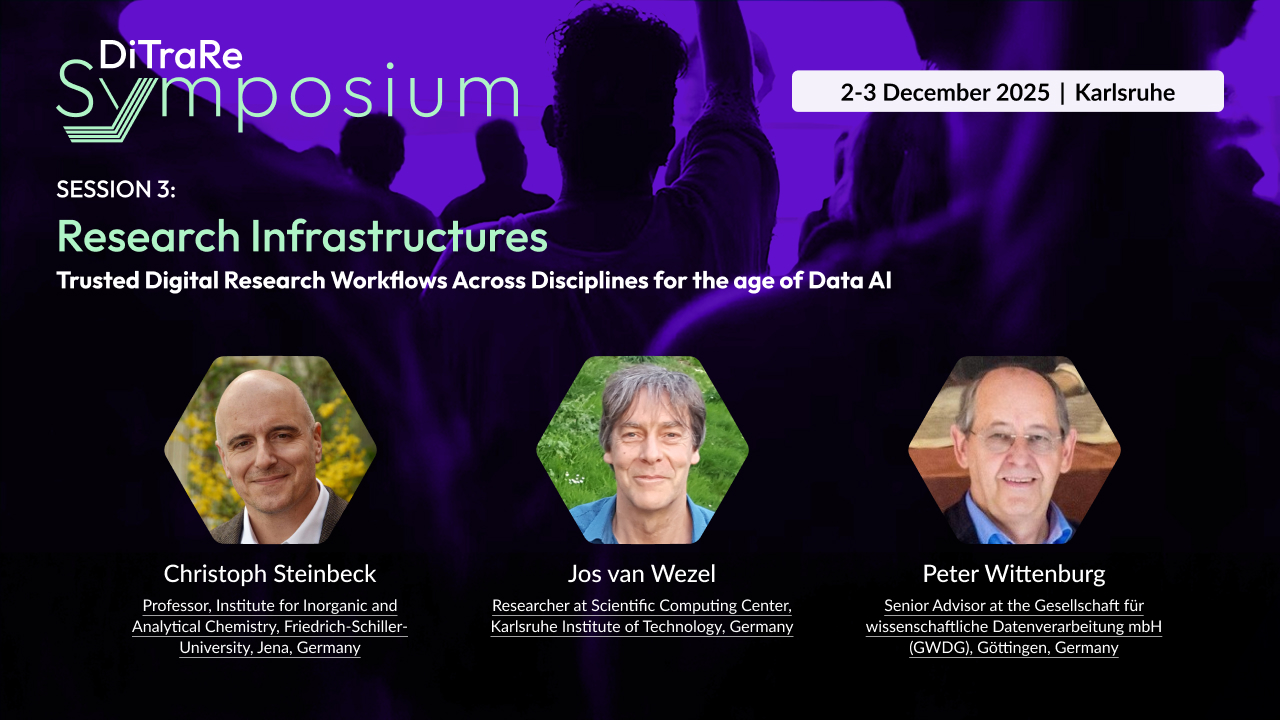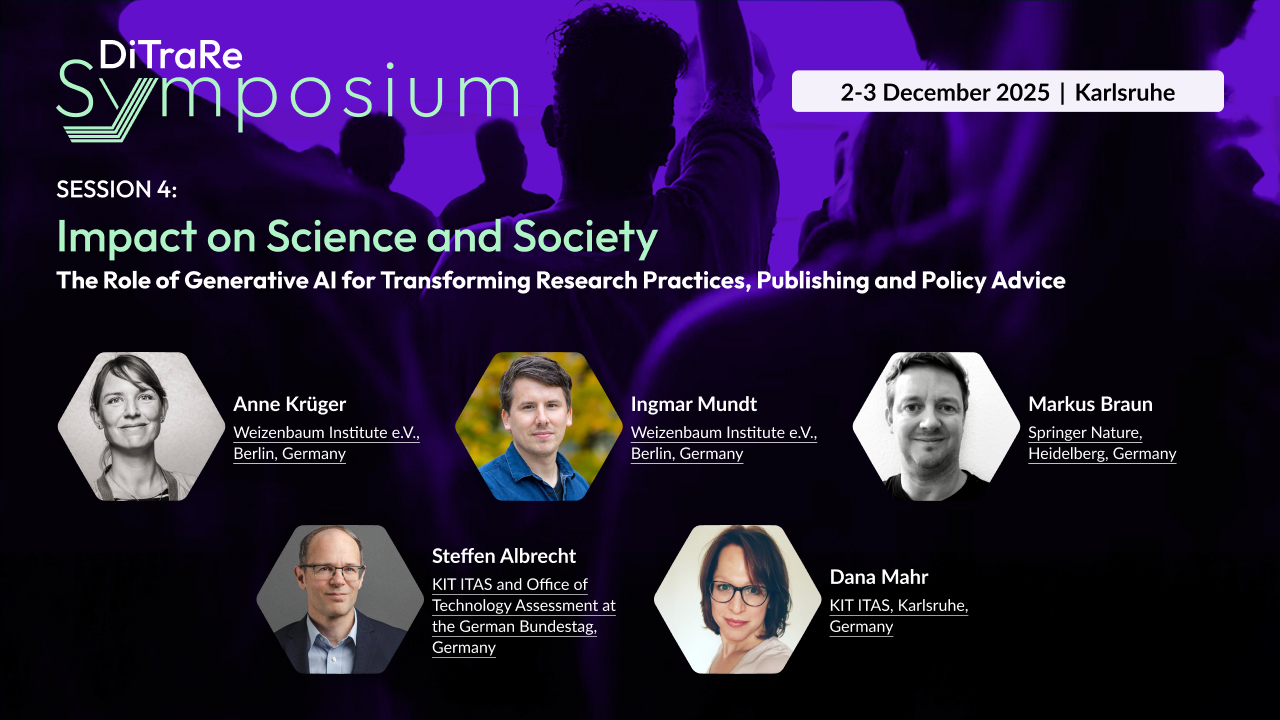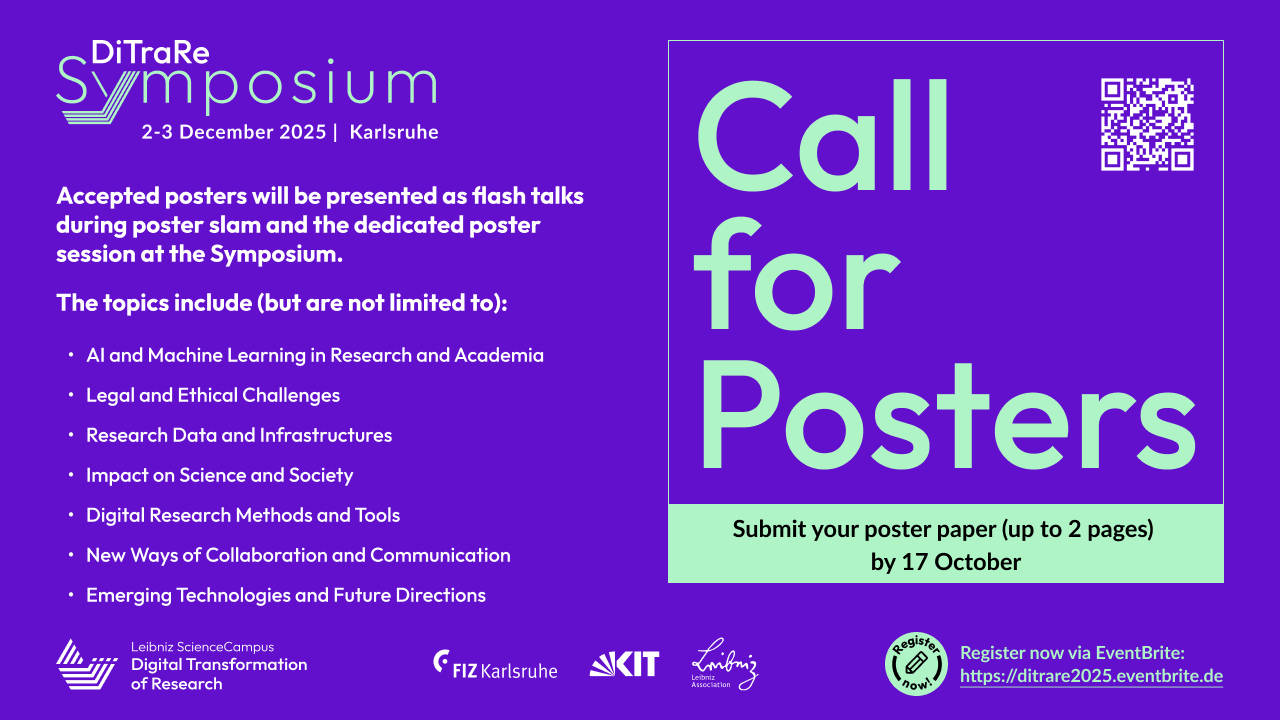DiTraRe Symposium on Digitalisation of Research 2025
We are excited to invite you to the DiTraRe Symposium, hosted by the Leibniz ScienceCampus Digital Transformation of Research (DiTraRe). The DiTraRe Symposium will take place on December 2-3, 2025 as a noon-to-noon event, at the Centre for Arts and Media (ZKM) in Karlsruhe. The event will focus on digital research practices, including the use of AI and open science. Expect an inspiring keynote, dynamic panel discussions, and interactive sessions that encourage lively exchange and collaboration. We look forward to seeing you there! Registration via EventBrite is open, register now!
Keynote Lecture
Human Research Strategies vs Research Shaped by Algorithms – Why do Humans Need Phenomena and Models?
We are delighted to have Mieke Boon, Professor Philosophy of Science in Practice, University of Twente, Netherlands, as our keynote speaker! Here's what Mieke says about her talk:
In this keynote lecture at the Symposium on Digital Transformation of Research (DiTraRe), I will address two questions. First, what fundamental epistemological differences exist between human research strategies and research shaped by algorithms. Second, what are consequences for the objective phrased in the Reflection and Resonance dimension of DiTraRe “to establish trust in research that is shaped by algorithms, [where] it is vital to ensure transparent, reproducible practices and clear communication of findings.”
To explore these questions, I will draw on previous philosophical work that emphasizes the crucial role of descriptions of phenomena and conceptual models in human research strategies (Boon, 2015; 2020a). In contrast, ideas about AI-based scientific research suggest that phenomena and models are redundant once large amounts of data are available (Boon, 2020b).
In this lecture, I will use examples from experimental and empirical (data generating) practices in the natural, engineering and social sciences to explain how humans generate and use data, descriptions of phenomena and conceptual models in their scientific reasoning to arrive at a (scientific) knowledge.
My objective is to provide a deeper (epistemological) understanding of scientific reasoning strategies that align with human cognition and to invite critical reflection by the audience on how this compares to AI-based research.
Session 1: Knowledge Representation and AI
Artificial Intelligence as an Additional Dimension to the Digital Transformation
Our first session will consist of three pitch talks from experts on Knowledge Organisation and AI and a fishbowl discussion, in which we want to actively include our audience.
- Ulrich Weinberg, Founding Director HPI d-school and Design Thinking Ambassador, Hasso-Plattner-Institute, Potsdam, with a talk Blueprint for an AI-Ready University: Design Thinking as the Engine of Change
- Torsten Schrade, Professor for Digital Humanities at the University of Applied Sciences in Mainz, with a talk From Artefacts to Algorithms: Federated Infrastructures, Knowledge Representation and AI in the Humanities
- Sonja Schimmler, Head of “Digitalization and Opening up Science” at Fraunhofer FOKUS and associated scientist at the Technical University of Berlin, with a talk Data Infrastructures as a Foundation for AI Projects
Session 2: Legal and Ethical Challenges
Law and Ethics in Digitalization of Research: Regulating Dynamic Processes with Ancient Orders
Invited experts on Legal and Ethical Challenges will share their insights during our Session 2. The session will also consist of an interactive Q&A panel.
- Fruzsina Molnár-Gabór, Professor for international Medicine- and Health Law as well as Data Privacy at University of Heidelberg, with a talk Legal Challenges Posed by AI in the Use of Research Data
- Dara Hallinan, Researcher at FIZ Karlsruhe - Leibniz Institute for Information Infrastructure, with a talk Navigating the Dynamic Relationship of Law and Ethics in the Digitalization of Research
Session 3: Research Infrastructures
Trusted Digital Research Workflows Across Disciplines for the age of Data AI
Our third session will consist of three short talks from experts on Research Infrastructures and a fishbowl discussion with an active audience participation.
- Christoph Steinbeck, Professor, Institute for Inorganic and Analytical Chemistry, Friedrich-Schiller-University, Jena, with a talk Advancing Machine Learning in Chemistry Through Open and Large-Scale Data Initiatives
- Jos van Wezel, Researcher at Karlsruhe Institute of Technology, Scientific Computing Center (KIT SCC) Karlsruhe, with a talk Leveraging Established E-Infrastructures to Enhance Research Data Management and EOSC Integration
- Peter Wittenburg, Senior Advisor at the GWDG, Göttingen, with a talk Data Sovereignty, Transparency, Accountability and Persistence in AI-Times
Session 4: Impact on Science and Society
The Role of Generative AI for Transforming Research Practices, Publishing and Policy Advice
Our Session 4 will concentrate on Impact on Science and Society. Numerous experts from the field will present their insights, which will later be reflected on together with the audience.
- Anne Krüger, Research Group Lead at the Weizenbaum-Institut e.V., Berlin, with a joint talk Digital Transformation in Science – the Role of Generative AI Tools for Changes in Research Practice and Knowledge Production
- Ingmar Mundt, Research Associate at the Weizenbaum Institute e.V., Berlin, with a joint talk Digital Transformation in Science – the Role of Generative AI Tools for Changes in Research Practice and Knowledge Production
- Markus Braun, Director Book Publishing Solutions, Springer Nature, Heidelberg, with a talk Publishing in the Age of AI: How Generative AI Is Transforming Scientific Communication
- Steffen Albrecht, Scientist at Karlsruhe Institute of Technology, Institute for Technology Assessment and Systems Analysis (KIT ITAS) and Office of Technology Assessment at the German Bundestag, with a talk Generative AI in the Practice of Scientific Policy Advice - Potentials and Challenges at the Interface of Science and Politics
- Dana Mahr, Researcher at Karlsruhe Institute of Technology, Institute for Technology Assessment and Systems Analysis (KIT ITAS), who will provide a commentary Reflection on the Science Society Interface of Generative AI
Call for Posters
Three weeks left to submit your poster paper to our Symposium!
📅 Submission deadline: Oct 17, 2025
ℹ️ We accept contributions in all topics related to the broadly understood digitalisation of research! A few examples:
- Knowledge representation and AI
- Ethical and legal challenges
- Research infrastructures
- Impact on science and society
- Protected data spaces
- Smart data acquisition
- AI-based knowledge realms
- Publication cultures
Why Present a Poster?
🚀 Showcase your research to a diverse audience of experts and peers.
🚀 Receive valuable feedback and expand your professional network.
🚀 Gain visibility and recognition for your work.

